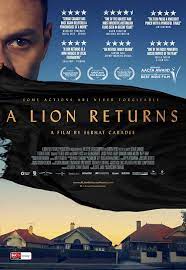
A LION RETURNS
Australia, 2020, 91 minutes, Colour.
Tyler De Nawi, Danny Alacci, Jacqui Purvis, Serhat Caradee, Taffy Hany, Frances Duca.
Directed by Serhat Caradee.
Writer-actor-director, Serhat Caradee, knows Sydney’s western suburbs well, dramatising young men of Middle Eastern background trying to find their place in his 2009 Cedar Boys.
Here he returns to the Sydney suburbs but this time extending his themes beyond Australia. In fact, the issue of men, socialised into a Jihad mentality, going to fight in Syria, considered as criminal by the Australian government, wanting to return to Australia for a family death.
The drama focuses on a young man returning from Syria to visit his dying mother. He tries to negotiate getting into the house and to his mother’s room with his brother. However, his father is extremely antagonistic about his son, then towards his son when he finds that he has come to the house, forbidding him to see the mother.
There is a range of supporting characters, men and women, filling out the background of the life of this kind of family, relationships, crises.
There are also some suspicions about the man returning from Syria and the possibilities of his recruiting further soldiers.
And, there are some moving human moments when the son is able to go into his mother’s room – and her response to him.
- An Australian story, Muslim communities, migration to Australia, mosques and leadership, brainwashing for Jihad, Australians going to Syria to fight for ISIS? The consequences?
- The city setting, the suburb, the street, homes, old-style Australian interiors, the backyard? The musical score?
- The style of the film, emphasis on dialogue and conversation, interactions? Jamaal and his brother? Jamal and his wife? Jamal and his mother? Jamal and his uncle? The uncle and Omar? The father and his confrontation with his son? The use of close-ups for these interactions? Their length? Dramatic impact?
- The introduction to Jamal, in the car, the flashback memories to his family, the medal, his mother? Omar coming to the car, their long conversation? Revelations about Jamal, younger brother, depression, not able to talk to his brother, going to the mosque, his uncle, the brainwashing, his going to Syria? The gradual revelation of what he had done? His continued reference to Jihad, to the will of Allah, deaths to the infidel…? His story of the attacks, the slaughters, the young girls, used for sex, his rescuing the young girl? His determination and down questioning faith?
- Omar, the older brother, studies, teaching? Not protecting his brother when young? The mystery of Jamal going overseas? Omar explaining to Jamal, the effect on the family, under suspicion, police investigation? The effect on their mother, her illness, terminal? And Jamal saying he wanted to see his mother? The hostility and denunciation by his father?
- Jamal, the request to see his mother, his assistance? Out of the car, waiting at the side of the house, seeing his son, his wife and the confrontation, her asking for explanations, her hurt? The boy and his being embraced by his father?
- The uncle, talking with Jamal, the contact, knowing the background, the Syrian connections, urging Jamal to be faithful? His talking to his brother-in-law?
- Jamal, going to see his mother, her response, her questions, her love, her disappointment in what he had done, asking about killing? Her calling for her husband?
- The other members of the family, the women in the mother’s room, Jamal’s wife and the conversations, his sister and her interventions?
- Jamal, coming out from his mother, the confrontation with his father, asking his father’s forgiveness, his father phoning the police?
- The dismay of the family, Jamal, his stands, taking out his gun?
- The film stopping – could the family overcome Jamal and his gun? Did he kill himself?
- Topical Australian themes with the number of Australians going to fight in the Middle East, wives and children present, Jihad, fanaticism, extreme interpretations of Islam?